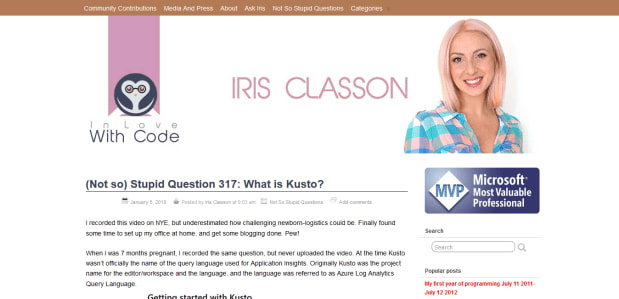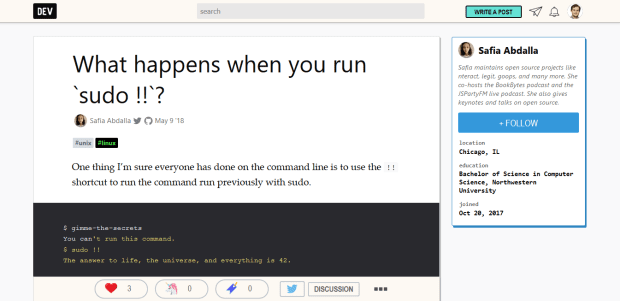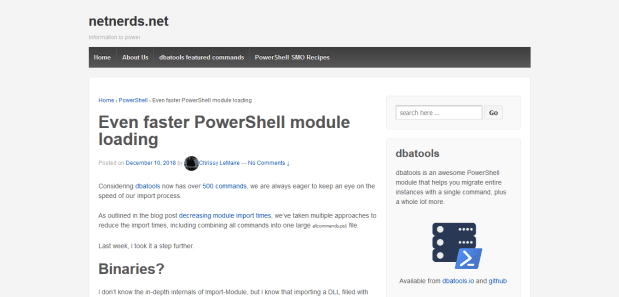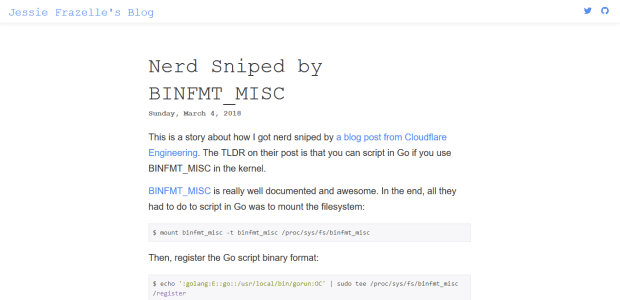10 great tech blogs you should read (that are written by women)

Tom Wright
Posted on January 9, 2019
Recently I’ve been on a quest to find more technical blogs written by women. In today’s post, I share 10 of my favourites, on topics ranging from Kubernetes to web accessibility. It’s a list personal to my tastes, but the aim is to ensure that we don’t lose sight of the fact that you don’t need to be a man to be at the top of your tech game.
Just want the list? Click here!
Background
In December I wrote a post about trying to be a better supporter of women in tech. It got more backlash than I had expected and I’ve been thinking about my next move ever since.
One thing that struck me was that my own blogroll (that’s a word people still use, right?) was very male-dominated. It seems likely that I’m not alone in this. Perhaps the views I was reading were the product of ignorance. And perhaps I could help dispel them by making it harder to ignore the many brilliant developers out there who happen to be women.
The starting point had to be broadening my own reading list, so I put out a tweet asking for recommendations:
Thomas Wright@tdwrightHivemind - I'm looking for some new tech blogs to read and in particular some new tech blogs written by women. 👩💻
My interests are predominantly backend, cloud and .NET, but I also love a wildcard. 🃏
So, if there's someone you think I should be reading, hit me up! 😀22:27 PM - 19 Dec 2018
Things were pretty quiet at first and I got a bit disheartened. But then Elana Tee got the ball rolling with some excellent suggestions – all of which I’ve included below. (Thanks Elana! 🙏) Buoyed by the nudge, I kept digging and started to find more and more.
I’ve selected my ten favourites to showcase in this post. For each, I’ve tried to give a small amount of background and have highlighted my favourite recent post. Give them a read and subscribe if you like them.
Before we get started…
Before I dive into my list, I just want to explain my criteria a little. I’m not trying to make a definitive list here. In fact, it’s a very personal thing.
As anyone who knows me will be aware, I only ever recommend things that I enjoy / find useful myself. (Obviously “your mileage may vary”, but I just don’t feel qualified to make recommendations from outside of my personal experience.) It’s an important point to make here because I’m not trying to say that the blogs I’ve picked are somehow better than the ones I found but didn’t pick.
One thing that I’m very conscious of is that my tastes skew towards back-end and dev-ops more than front-end or design. With that in mind, I don’t want my selections below to be interpreted as any sort of judgement on the worth of front-end work. In fact, let me go on record as saying that I view front-end people as developers just as much as back-end developers.
Likewise, I’ve leant towards blogs (and specific posts) that are more technical. Regular readers will know that I really value professional skills (aka “soft skills”) as much as technical skills, but that’s not what this post is about. If I’m trying to change the perceptions of women in tech, I need to draw attention to the fact that women are out there doing the alpha-nerd stuff, as well as kicking ass with their interpersonal and organisational skills (which stereotypes already assert that women are good at).
Another factor influencing my selections was the level of recent activity. I found loads of excellent blogs by some very smart women that had just gone stale. Now, don’t get me wrong, I’ve had tumble-weed blogs in the past – I get that they can be a millstone at times. I’ve not included these old blogs at this time because I want to celebrate the women blogging now.
The blogs
Wow, that was a lot of preamble! Anyway, without any further ado, let’s take a look at the list…
1. –verbose (Vicky Lai)
Vicky Lai blogs about making stuff with a wide variety of technologies that include Linux, AWS, and Go. My favourite of her recent posts is about creating a Twitter bot in Go on AWS.

This post is an excellent walk-through of all the key steps needed to make something cool and useful with Lambda in AWS. Along the way, Vicky introduces a couple of helpful techniques readers may not have come across before.
Something I really like about Vicky’s blog is how she often uses thoughtful food analogies to explain some pretty abstract ideas. It makes them deliciously easy to remember.
Vicky also has a separate blog, HerOneBag.com where she posts her experiences of travelling with just one bag.
2. Julia Evans
Julia Evans blogs about a really wide range of back-end technologies, including Rust, Ruby, and Python. There’s also a good smattering of Linux-y stuff there too.
Despite the abundance of technologies I had to choose from, the post I’ve picked to showcase is pretty agnostic. It’s about how we can manage risk when we introduce new software into a high-uptime system.

The other thing to know about Julia Evans is that she writes really cool, really useful, old-school Zines over on her Wizard Zines site. (They’re so good, I even dropped cold, hard, cash for one of the premium ones.)
3. Base CS (Vaidehi Joshi)
Vaidehi Joshi wrote about a fundamental computer science topics every Monday in 2017 and her articles are amazing. By using her own learning experience as a starting point, Vaidehi sympathetically guides the reader through some pretty hard-core concepts.
I’ve chosen to highlight one of the later topics; this guide to abstract syntax tree was published in December 2017.

I love how the hand-drawn notes and diagrams peppered through the text help soften the topic and make it more accessible. (There’s a certain degree of jealousy here – my handwriting is atrocious!)
More importantly, committing to a new post of this calibre every week for a year is very impressive. And the result is a free resource to rival any textbook.
4. Vogue & Code (April Speight)
April Speight blogs mostly about non-technical topics but does also write about technical topics too. Her blog is quite new, but she seems to be really going for it. The post I’ve selected is one of her more technical and I think it might be a sign of the sort of thing we might see more of in due course.

I love posts like this, where someone takes a bunch of technologies and shows you how they can be combined in cool ways. April does an excellent job of laying down each step and walking the reader through it.
5. The Zen of Programming (Ali Spittel)
Ali Spittel blogs about web development (including React) as well as non-technical skills (such as public speaking). She has also written some really helpful posts about writing a blog.
The post that I’ve chosen to highlight, however, is a walk-through of how she took her terminal to the next level:

I really like how practical Ali’s posts are. They’re packed with code, screenshots, and examples. Plus (as regular readers will know) I’m a big fan of getting my coding environment just so – posts like this one are my personal kryptonite!
6. Jessie Frazelle’s Blog
Jessie Frazelle blogs about containers (esp. Docker and Kubernetes), security and open source. Now, being more of a FaaS kinda guy, I’m afraid I don’t know a whole lot about containers. From the bits I do understand, it’s clear to me that Jessie is a serious heavyweight.
For the purposes of this blog post, the example I’ve picked is actually about using Go as a scripting language on Linux systems.
This post is a response to one by the Cloudflare engineering team and I really like how Jessie a) admits to getting sniped and then b) distil the meat of their post into a half-dozen lines. Plus, being able to use arbitrary languages for scripting in terminal environments is just deeply cool.
7. In Love With Code (Iris Classon)
Iris Classon blogs about Microsoft technologies, including ASP.NET, Powershell, Windows and Azure. It’s actually a bit strange that I’ve not come across Iris before, as her interests broadly align with mine.
A format Iris uses a lot is to answer “(Not So) Stupid Questions” posed to her by readers. She uses a mix of video and text, which I find quite interesting. The post I’ve selected is one from this series and it is about Kusto.

I had picked a different post when I first came across Iris’ blog, but when she posted this I had to swap it in, as it’s a question I actually had to ask not so long ago.
Aside: For the record, I don’t think the Application Insights team have done a wonderful job of making it clear that the analytics language is called Kusto. When I (eventually) made the connection, it definitely made it easier to find documentation and tutorials.
Another thing: I am in complete awe of anyone who posts a video less than a month after having a baby. When my son was that small, I was too tired to think, let alone composed enough to record a video!
8. A11y with Lindsey (Lindsey Kopacz)
Lindsey Kopacz blogs mostly about web accessibility (aka “a11y”). It’s a little different from the other blogs in this list, as it’s mainly front-end related. However, I’ve got a soft-spot for accessibility (it was the subject of my doctorate) and it’s a great blog, so I had to include it!
The post I’ve chosen as a representative example is on the topic of making cool looking custom checkboxes that are still accessible to people using a screen-reader and keyboard input (i.e. not a mouse).

What I love about Lindsey’s writing is the authority and focus she gives to an often overlooked area, without guilt-tripping readers that might not be so aware of the issues. She’s clearly passionate about it, but remains matter-of-fact and practical, which I reckon is the probably the best way to gently nudge people into better behaviours.
9. Safia Abdalla
Safia Abdalla blogs about a wide range of things, including Git, Linux, and Python. She’s recently restarted posting after a brief hiatus earlier in the year. Prior to that hiatus, she ran a great series examining how common Linux utilities work and putting them under the microscope with strace. It’s one of these that I’ve picked as an example: “What happens when you run sudo !!?”

sudo !!?“
It’s the sort of question that never occurs to me, but that I’m always intrigued by when someone points it out. And Safia does an excellent job of dissecting it carefully with plenty of examples.
10. netnerds.net (Chrissy LeMaire)
Chrissy LeMaire blogs predominantly about SQL Server and Powershell. This isn’t so surprising when we consider that she’s the primary maintainer of the dbatools and dbachecks Powershell modules.
The post I’ve chosen to highlight from Chrissy’s blog is about how she was able to use compression to drastically improve the loading time of one of these modules.

As the maintainer of an open-source project myself, I am always fascinated by the “behind the scenes” work undertaken to improve the experience for our fellow developers. This post is a great example of this, as well as being a great technical reference.
Reflections
I wanted to showcase some tech blogs written by women to try to further normalise the idea that great developers are sometimes women. In doing the research for this I’ve learnt loads and written a huge list of things I need to try. For example, I need to revisit Go – it seems to be what all the cool kids are using these days!
One of the things that struck me is the very different language and range of topics covered by female writers. It shouldn’t surprise me I guess – I mean I have spoken to women before! 😉 But I think I was maybe expecting for some of the femininity to get lost along the way? Not a chance. Several of the blogs I’ve read over the past couple of weeks have included articles on fashion mixed in with the technical posts. Many more were packed full of (feminine) personality in loads of other ways. It was really refreshing.
I suppose the factor underlying my surprise is a presumption that my own writing is entirely neutral. It’s not. When you’re a member of the dominant group, you don’t notice that you speak with an accent. I implicitly expected all technical bloggers to use the same voice and register as I’m used to reading and writing, but only because the vast majority of technical blogs I’ve read in the past were written by people who look and sound a lot like me and share a lot of my interests.
And I think the fact that this surprised me is interesting beyond just in terms of blogs. In particular, it made me think about the language we use when we’re advertising job opportunities. If we have implicit expectations about how we (i.e. men) communicate, we may accidentally signal that the job is for people like us. We have to be open to the idea that the best developer for a role may well not be a man and we, therefore, need to be mindful of the impression we make with the language we use.
Something else I noticed during the research for this post was the number of women who produce technical content in media other than blogs. For example podcasts, Youtube, and live-streaming. I’m trying to work out if this is to do with women (and possibly women of colour in particular?) or just to do with the fact that the world has moved on for everyone except me! I’d be interested to hear your thoughts on this, dear reader.
My final reflection is a sad one. During my research, I saw far too many blog posts in which women were either recounting unpleasant experiences (including sexual harassment) or actively considering leaving the profession. In this post, I’ve aimed to celebrate the contributions of brilliant women to our profession, but it seems impossible to completely avoid the fact that women get a really raw deal in exchange. Perhaps a topic I’ll have to revisit another day.
Fin
I hope I’ve been successful in my primary objective. The 10 blogs I’ve featured are all examples of top-notch technical content. The fact that I eventually had to whittle down a long list to get to 10 just goes to show how much quality content is being generated by our female colleagues.
I assume that all the bloggers I’ve featured write for broadly the same reasons I do: to try and share the cool things we’ve learnt with our peers. Nevertheless, when someone who is under-represented in tech writes a blog, it also serves the secondary purpose of increasing the visibility of their particular group. In other words, it helps to erode the stereotypes of who programmers are. I hope that by showcasing these blogs, I’ve helped in my own small way to increase their effectiveness in this regard.
- If you’re a man reading this, I hope I’ve helped draw your attention to content that may change how you think of women who code.
- If you’re a woman, I hope these blogs help you feel a bit less isolated and maybe a bit more part of the community.
I may well do a follow-up post in the future with another 10 technical blogs written by women. If you know of someone I should include (even if it’s you!), please let me know in the comments.

Posted on January 9, 2019
Join Our Newsletter. No Spam, Only the good stuff.
Sign up to receive the latest update from our blog.



